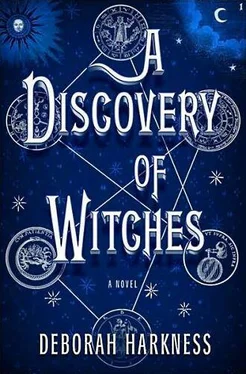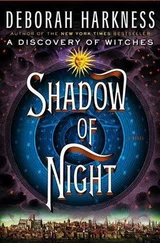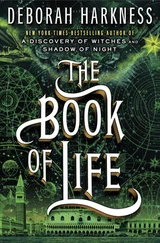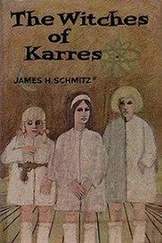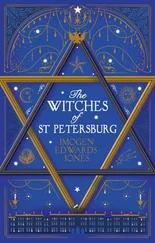“Where?”
“We’ll go to the gatehouse,” Matthew said matter-of-factly.
“There’s a café there?”
“No, but there’s a kitchen. A place to sit down, too. I can make tea,” he teased.
“Matthew,” I said, shocked, “is this your house?”
By that time we were standing in the doorway, looking out into the courtyard. I saw the keystone over the house’s gate: 1536.
“I built it,” he said, watching me closely.
Matthew Clairmont was at least five hundred years old.
“The spoils of the Reformation,” he continued. “Henry gave me the land, on the condition that I tear down the abbey that was here and start over. I saved what I could, but it was difficult to get away with much. The king was in a foul mood that year. There’s an angel here and there, and some stonework I couldn’t bear to destroy. Other than that, it’s all new construction.”
“I’ve never heard anyone describe a house built in the early sixteenth century as ‘new construction’ before.” I tried to see the house not only through Matthew’s eyes but as a part of him. This was the house he had wanted to live in nearly five hundred years ago. In seeing it I knew him better. It was quiet and still, just as he was. More than that, it was solid and true. There was nothing unnecessary—no extra ornamentation, no distractions.
“It’s beautiful,” I said simply.
“It’s too big to live in now,” he replied, “not to mention too fragile. Every time I open a window, something seems to fall off it, despite careful maintenance. I let Amira live in some of the rooms and open the house to her students a few times a week.”
“You live in the gatehouse?” I asked as we walked across the open expanse of cobbles and brick to the car.
“Part of the time. I live in Oxford during the week but come here on the weekends. It’s quieter.”
I thought that it must be challenging for a vampire to live surrounded by noisy undergraduates whose conversations he couldn’t help overhearing.
We got back into the car and drove the short distance to the gatehouse. As the manor’s onetime public face, it had slightly more frills and embellishments than the main house. I studied the twisted chimneys and the elaborate patterns in the brick.
Matthew groaned. “I know. The chimneys were a mistake. The stonemason was dying to try his hand at them. His cousin worked for Wolsey at Hampton Court, and the man simply wouldn’t take no for an answer.”
He flipped a light switch near the door, and the gatehouse’s main room was bathed in a golden glow. It had serviceable flagstone floors and a big stone fireplace suitable for roasting an ox.
“Are you cold?” Matthew asked as he went to the part of the space that had been turned into a sleek, modern kitchen. It was dominated by a refrigerator rather than a stove. I tried not to think about what he might keep in it.
“A little bit.” I drew my sweater closer. It was still relatively warm in Oxford, but my drying perspiration made the night air feel chilly.
“Light the fire, then,” Matthew suggested. It was already laid, and I set it alight with a long match drawn from an antique pewter tankard.
Matthew put the kettle on, and I walked around the room, taking in the elements of his taste. It ran heavily toward brown leather and dark polished wood, which stood out handsomely against the flagstones. An old carpet in warm shades of red, blue, and ocher provided jolts of color. Over the mantel there was an enormous portrait of a dark-haired, late-seventeenth-century beauty in a yellow gown. It had certainly been painted by Sir Peter Lely.
Matthew noticed my interest. “My sister Louisa,” he said, coming around the counter with a fully outfitted tea tray. He looked up at the canvas, his face touched with sadness. “Dieu, she was beautiful.”
“What happened to her?”
“She went to Barbados, intent on making herself queen of the Indies. We tried to tell her that her taste for young gentlemen was not likely to go unnoticed on a small island, but she wouldn’t listen. Louisa loved plantation life. She invested in sugar—and slaves.” A shadow flitted across his face. “During one of the island’s rebellions, her fellow plantation owners, who had figured out what she was, decided to get rid of her. They sliced off Louisa’s head and cut her body into pieces. Then they burned her and blamed it on the slaves.”
“I’m so sorry,” I said, knowing that words were inadequate in the face of such a loss.
He mustered a small smile. “The death was only as terrible as the woman who suffered it. I loved my sister, but she didn’t make that easy. She absorbed every vice of every age she lived through. If there was excess to be had, Louisa found it.” Matthew shook himself free from his sister’s cold, beautiful face with difficulty. “Will you pour?” he asked. He put the tray on a low, polished oak table in front of the fireplace between two overstuffed leather sofas.
I agreed, happy to lighten the mood even though I had enough questions to fill more than one evening of conversation. Louisa’s huge black eyes watched me, and I made sure not to spill a drop of liquid on the shining wooden surface of the table just in case it had once been hers. Matthew had remembered the big jug of milk and the sugar, and I doctored my tea until it was precisely the right color before sinking back into the cushions with a sigh.
Matthew held his mug politely without once lifting it to his lips.
“You don’t have to for my sake, you know,” I said, glancing at the cup.
“I know.” He shrugged. “It’s a habit, and comforting to go through the motions.”
“When did you start practicing yoga?” I asked, changing the subject.
“The same time that Louisa went to Barbados. I went to the other Indies—the East Indies—and found myself in Goa during the monsoons. There wasn’t a lot to do but drink too much and learn about India. The yogis were different then, more spiritual than most teachers today. I met Amira a few years ago when I was speaking at a conference in Mumbai. As soon as I heard her lead a class, it was clear to me that she had the gifts of the old yogis, and she didn’t share the concerns some witches have about fraternizing with vampires.” There was a touch of bitterness in his voice.
“You invited her to come to England?”
“I explained what might be possible here, and she agreed to give it a try. It’s been almost ten years now, and the class is full to capacity every week. Of course, Amira teaches private classes, too, mainly to humans.”
“I’m not used to seeing witches, vampires, and daemons sharing anything—never mind a yoga class,” I confessed. The taboos against mixing with other creatures were strong. “If you’d told me it was possible, I wouldn’t have believed you.”
“Amira is an optimist, and she loves a challenge. It wasn’t easy at first. The vampires refused to be in the same room with the daemons during the early days, and of course no one trusted the witches when they started showing up.” His voice betrayed his own ingrained prejudices. “Now most in the room accept we’re more similar than different and treat one another with courtesy.”
“We may look similar,” I said, taking a gulp of tea and drawing my knees toward my chest, “but we certainly don’t feel similar.”
“What do you mean?” Matthew said, looking at me attentively.
“The way we know that someone is one of us—a creature,” I replied, confused. “The nudges, the tingles, the cold.”
Matthew shook his head. “No, I don’t know. I’m not a witch.”
“You can’t feel it when I look at you?” I asked.
“No. Can you?” His eyes were guileless and caused the familiar reaction on my skin.
Читать дальше
